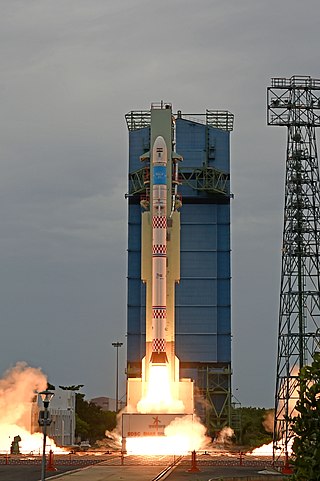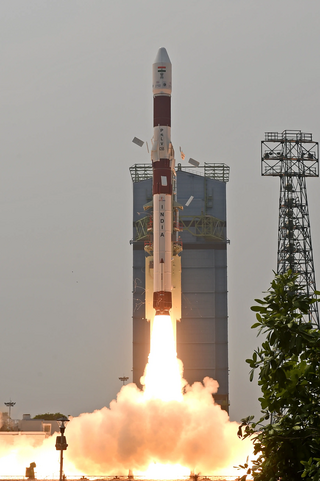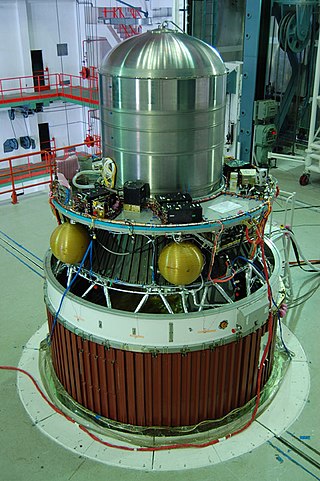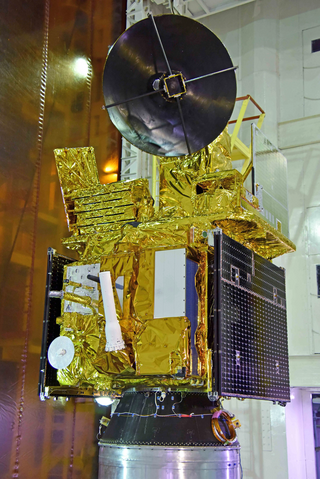
The Polar Satellite Launch Vehicle (PSLV) is an expendable medium-lift launch vehicle designed and operated by the Indian Space Research Organisation (ISRO). It was developed to allow India to launch its Indian Remote Sensing (IRS) satellites into Sun-synchronous orbits, a service that was, until the advent of the PSLV in 1993, only commercially available from Russia. PSLV can also launch small size satellites into Geostationary Transfer Orbit (GTO).

Dhruva Space Private Limited is an Indian private aerospace manufacturer headquartered in Hyderabad, Telangana. Founded in 2012 by Sanjay Srikanth Nekkanti, the company is engaged in the development of small satellites in the commercial, governmental and academic markets. It provides full-stack space-engineering solutions across launch, space and ground segments – namely, the building, launching and operation of satellites.
PSLV-C34 was the 36th mission of the PSLV program and 14th mission of PSLV in XL configuration. The PSLV-C34 successfully carried and deployed 20 satellites in the Sun-synchronous orbit. With a launch mass of 320,000 kilograms (710,000 lb) and payload mass of 1,288 kilograms (2,840 lb), the C34 set a new record of deploying the maximum number of satellites by Indian Space Research Organisation in a single mission. The PSLV-C34 carried One Cartosat-2 satellite, SathyabamaSat, Swayam & 17 other satellites from United States, Canada, Germany & Indonesia.
PSLV-C2 was the second operational launch and overall fifth mission of the Polar Satellite Launch Vehicle (PSLV) program. This launch was also the forty-third launch by Indian Space Research Organisation (ISRO) since its first mission on 1 January 1962. The vehicle carried three satellites which were deployed in the Sun-synchronous low Earth orbit. The vehicle carried India's first remote sensing satellite Oceansat-1 (IRS-P4) as the main payload. It also carried South Korean satellite KITSAT-3 and German satellite DLR-Tubsat as auxiliary payloads. PSLV-C2 was the first Indian Expendable launch vehicle to carry and deploy more than one satellite in a mission. This was also India's and ISRO's first commercial spaceflight where South Korea and Germany each paid US$1.0 million to ISRO for launching their satellites.

PSLV-C37 was the 39th mission of the Indian Polar Satellite Launch Vehicle (PSLV) program and its 16th mission in the XL configuration undertaken by the Indian Space Research Organisation (ISRO). Launched on 15 February 2017 from the Satish Dhawan Space Centre at Sriharikota, Andhra Pradesh, the rocket successfully carried and deployed a record number of 104 satellites in Sun-synchronous orbits in a single mission, breaking the earlier record of launching 37 satellites by a Russian Dnepr rocket on 19 June 2014. This record was held until the launch of the Transporter-1 mission by SpaceX on 24 January 2021 which launched 143 satellites.

IRNSS-1H was the eighth in the Indian Regional Navigational Satellite System (IRNSS) series of satellites, after IRNSS-1A, IRNSS-1B, IRNSS-1C, IRNSS-1D, IRNSS-1E, IRNSS-1F and IRNSS-1G. It was lost in the launch failure of PSLV-C39 on August 31, 2017.

The Small Satellite Launch Vehicle (SSLV) is a small-lift launch vehicle developed by ISRO with payload capacity to deliver 500 kg (1,100 lb) to low Earth orbit or 300 kg (660 lb) to Sun-synchronous orbit for launching small satellites, with the capability to support multiple orbital drop-offs. SSLV is made keeping low cost, low turnaround time in mind with launch-on-demand flexibility under minimal infrastructure requirements.

PSLV-C42 was the 44th mission of the Indian Polar Satellite Launch Vehicle (PSLV) program and its 12th mission in the Core Alone (CA) configuration. PSLV-C42 successfully carried and deployed 2 Earth observation satellites in Sun-synchronous orbits at an altitude of 588 kilometres (365 mi). It was launched on 16 September 2018 by the Indian Space Research Organisation (ISRO) from the first launch pad of the Satish Dhawan Space Centre at Sriharikota, Andhra Pradesh. The two international satellites were launched as part of a commercial arrangement between Surrey Satellite Technology Limited (SSTL) and ISRO's commercial arm Antrix Corporation Limited, run under the auspices of the Indian Government's Department of Space.

The PSLV-C44 was the 46th mission of the Indian Polar Satellite Launch Vehicle (PSLV) program. It was the first flight of PSLV-DL, having 2 strap-on boosters and placed a primary payload Microsat-R and a secondary payload of Kalamsat V2 in Sun-synchronous orbits.

The PSLV-C45 is the 47th mission of the Indian Polar Satellite Launch Vehicle (PSLV) program. The Polar Satellite Launch Vehicle (PSLV)-C45 was launched on 1 April 2019 with a payload of 29 satellites, including one for electronic intelligence, along with 28 customer satellites from other countries.

The PSLV-C51 is the 53rd mission of the Indian Polar Satellite Launch Vehicle (PSLV) program. The Polar Satellite Launch Vehicle (PSLV)-C51 was launched at 04:54 (UTC) / 10:24 (IST) on 28 February 2021 with the main payload from Brazil, INPE's Amazônia-1 and 18 other ride-sharing small satellites.

The PSLV-C52 is the 54th mission of the Indian Polar Satellite Launch Vehicle (PSLV) program. The Polar Satellite Launch Vehicle (PSLV)-C52 was launched at 05:59 (IST) on 14 February 2022 with the RISAT-1A(EOS-04), INSPIREsat, INS-2TD as its main payload.

The PSLV-C53 is the 55th mission of the Polar Satellite Launch Vehicle (PSLV) and 15th mission using PSLV-Core Alone variant. PSLV-C53 is the second dedicated commercial mission of NSIL.

The PSLV-C49 is the 51st mission of the Indian Polar Satellite Launch Vehicle (PSLV) and second flight in 'DL' configuration. The Polar Satellite Launch Vehicle (PSLV)-C49 was successfully launched from Second Launch Pad, Satish Dhawan Space Centre on November 7, 2020, at 9:41 (UTC) /15:11 (IST) carrying EOS-01 along with nine international customer satellites.

The PSLV-C55 was the 57th mission of Indian Space Research Organisation's Polar Satellite Launch Vehicle (PSLV) and the 16th flight of the PSLV-CA variant.

PSLV Orbital Experiment Platform (POEM) also known as PSLV Stage 4 Orbital Platform (PS4-OP) is an orbital micro-gravity test bed based on spent fourth stage of PSLV. By adding modular subsystems for power generation, communication and stabilization like photovoltaic cells, Telemetry and Telecommand (TT&C) package, attitude control system, data storage etc. to PSLV fourth stage it is converted into a satellite bus. This augmented stage can then host payloads for up to six months while in orbit, making it useful for qualifying components, gaining space heritage and conduct experiments in micro-gravity conditions. Usually the fourth stage of PSLV is discarded after deployment of satellite and remains in orbit for a significant duration in a passive state as a piece of space debris.

The PSLV-C56 was the 58th mission of Indian Space Research Organisation's Polar Satellite Launch Vehicle (PSLV) and the 17th flight of the PSLV-CA variant, and was launched from Satish Dhawan Space Centre First Launch Pad (FLP).

Oceansat-3 is an Earth observation satellite, which is the third satellite in the Oceansat series launched by Indian Space Research Organisation (ISRO). It was launched on 26 Nov 2022, 06:26 UTC using a PSLV rocket from Satish Dhawan Space Centre, First Launch Pad (FLP). The satellite aims to improve the existing remote sensing capabilities related to the field of oceanography.

The PSLV C-58 was the 60th flight of the Indian Space Research Organisation's Polar Satellite launch Vehicle. It carried the XPoSAT mission along with rideshare payloads.

















